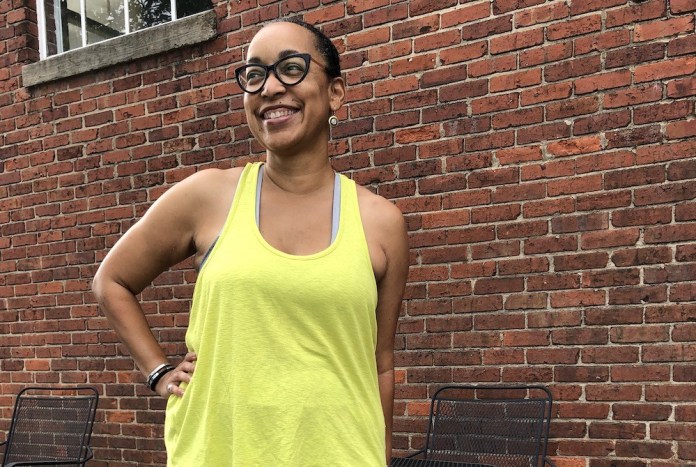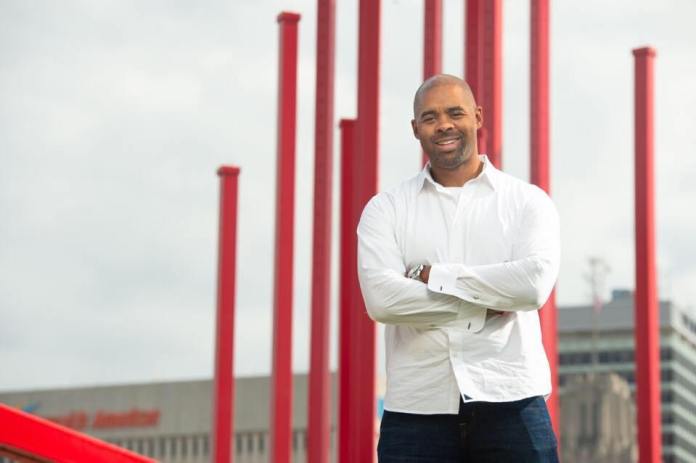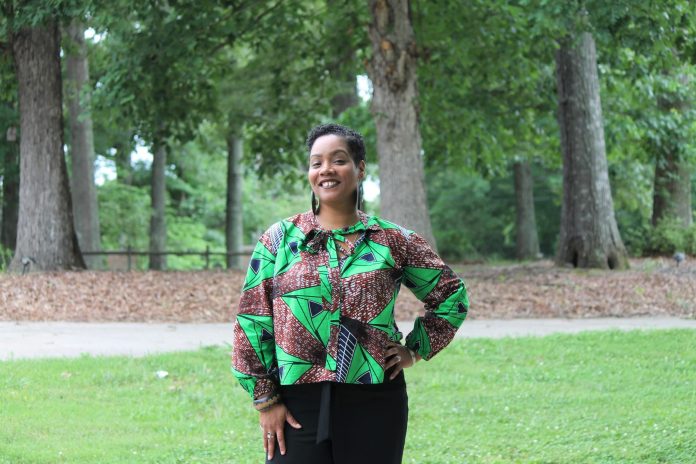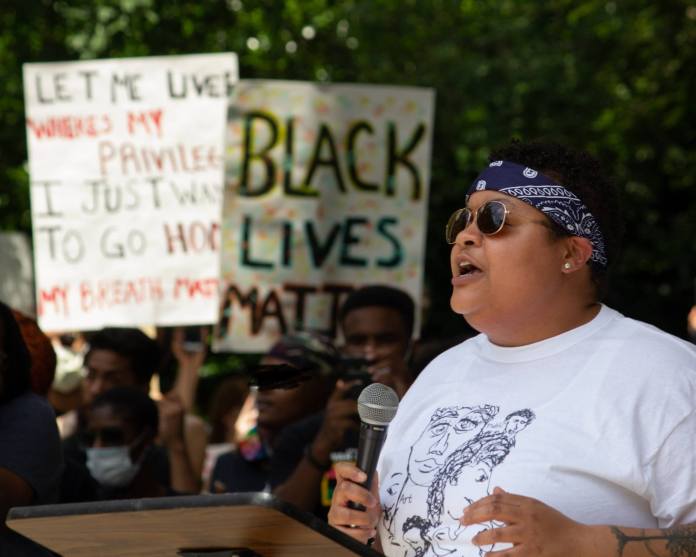
First came the virus, then came the uprising.
At virtually every turn this year, Black Americans have been dealt blow after traumatic blow on top of the ongoing burden of centuries of mistreatment from an unjust system built on racism and white supremacy. And with uprisings against systemic racism and police brutality bubbling up in every state, it’s hard to escape the perpetual reminder that this country wasn’t built for them despite being built by them. Black lives matter, but Black mental health matters too. As activists take to the streets to fight for their lives and as front-line workers — who are often people of color — continue to bear the brunt of the virus, local Black mental health professionals and activists talk about the importance of self-care and mental health awareness in the Black community, especially now.
‘Yoga brings you back to balance’

Tamara Jeffries never intended to become a yoga instructor.
A Bennett College journalism professor and former editor in chief of Essence magazine, Jeffries initially began practicing yoga in the ’80s when she was going through a difficult time in her life. She decided to take yoga teacher training to deepen her practice but didn’t actually use her license to teach others until much later.
In 2013, after she was employed at Bennett, Jeffries decided to teach a small yoga class on campus. It filled up immediately.
“I had 30 people in each class and then people were coming to me like, ‘Can you please let me in?’ And I was like ‘What’s going on? Why do y’all wanna be here?’” Jeffries says.
She asked the women who were taking the class through a survey whether they had anxiety or depression and found that many of them did. That’s when Jeffries realized that yoga could be a form of therapy for her students.
“What we know is that mental health is an issue on all college campuses but when you’re looking at the subsets in our population, depression and anxiety tends to be high among women, it tends to be high in teenagers, and it tends to be high in Black folks,” Jeffries says. “On our campus there’s almost no way out; you’re at risk one way or another.”
Since she started teaching years ago, Jeffries also started teaching weekly classes at Rise and Flow yoga studio in Greensboro because she kept hearing from women, particularly Black women, that they wanted to take her classes. And for many, having a Black teacher can mean that they are able to experience the class without any inhibitions.
“If you are coming to Rise and Flow, you’re going to get a Black teacher,” Jeffries says. “That makes a difference to people because the reason that a lot of people come to yoga nine out of 10 times is to stretch and to relax, but if you are in a situation and you’re concerned about microaggressions, you can’t do that…. I go to studios all the time and I might be the only Black person in the room, but it’s a different feeling and a different sense when I’m in a room with other Black folks with a Black teacher.”
Jeffries talks about whole yoga, or the idea that yoga is more than just the physical movement of one’s body. Rather, she thinks of it as the breath and the body, the philosophy and the science behind the practice. She also tries to teach her students how to practice the principles of yoga off of the mat.
“Like when you are taking a test, did you practice truthfulness by not cheating? Or when you were having a disagreement with your roommate, did you practice ahimsa or nonviolence by not harming her?” Jeffries explains.
“It’s about how are we living our lives according to yoga philosophy.“
And in these stressful and unprecedented times, Jeffries says everyone can learn to care for themselves through yogic principles.
“The thing I keep preaching is to be still, stop, take a breath,” she says. “There’s a lot going on; take a breath. Take the time that you need. I think of my grandmother who after dinner would sit on the porch. She would just sit. It wasn’t about chatting; it was just sitting. Just be still and quiet at the end of the day…. Doing your activism is an important thing to do psychologically. You can take action, and it helps you feel less out of control…. But you still have to be still. The meditative part of yoga is being still. Get off your phone. Give yourself some quiet time and see what bubbles up and then honor your gift and then be gentle with yourself. This ain’t new. None of this is new to us. We’ve swallowed it down and swallowed it down. Now it’s bubbling up for everyone. Be gentle with yourself.”
‘Seek out your local counselor’

Michael Brooks has been pretty busy these last few weeks.
As a NC A&T University counseling professor who specializes in mental health for Black men, Brooks has been getting a lot of calls and requests for interviews in the wake of recent police shootings of unarmed Black men and women.
“There have been upticks in the attention that Black men have received,” Brooks says. “It started with Trayvon Martin in 2013. After Trayvon, there were others who popped up.”
As a licensed counselor as well, Brooks says he started looking into how counseling and mental wellness professionals were reacting to the police shootings and what effect that had on Black men. In 2016, he co-authored a study titled “Hands up: police shooting of young Black males: Implications for social work and human services” in the Journal of Human Behavior in the Social Environment. The work took about two years to get published, and Brooks worried that the material wasn’t going to be relevant by the time it was finalized. Unfortunately, he was wrong.
In recent weeks, Brooks says Black fathers have contacted him to ask how to have conversations with their kids about police brutality. He says he’s had to have that conversation with his own kids as of late.
“We are honest with our kids,” Brooks says. “I say, ‘This man was killed. Police made a mistake and killed him.’ My kids have a healthy fear of law enforcement naturally. Fortunately, we have a good friend who is a sheriff, but they see him as being an exception.”
As a Black male counselor, Brooks says he understands the weight many Black men carry on a daily basis.
“That’s the unfortunate tax of being a Black man in America,” he says. “We have to live, eat and breathe with it. I think that you become accustomed to this way of life. The America that I live in, I have to have a different type of spatial awareness.”
Despite the difficulties, Brooks says therapy remains a taboo in many Black communities.
“The stigma is huge in counseling and I think it’s even larger for populations of color,” he says. “So rather than people engaging with some telehealth, we call our pastor, we call our friends, we call our family members. Counseling is way down at the bottom of the priorities list.”
And for those that aren’t comfortable yet with finding a therapist, Brooks says it’s fine to rely on other systems for help.
“Rely on entities and institutions that have been consistent in the Black community,” he says. “The church, the family — and then limit your exposure to toxic conversations. The things that kept you healthy in the past are what are going to keep you going. Just chill out, whatever that means for you.”
Brooks says he’s been seeing a therapist since the ’90s.
“I have several self-care practicing methods,” Brook says. “At the top, I’m in counseling. I do the work that I promote. I have a therapist that I see. Outside of counseling, I’m pretty aware of boundaries and my stress levels.”
Brooks says exercise is key for him. He cycles about a 100 miles per week and goes on walks with his kids. He also limits any stressful factors like media.
“The self-reflective person is the one who is evaluating who they are and how they engage with people,” he says. “The self-reflective person says, ‘What can I have done to make this better?’ And part of that is this person saying, ‘I’m not well; I’m not good.’ Self-care helps keep self-reflection in its proper place. It helps me to stay balanced.”
‘Healing is a journey, not a destination’

L. Niajallah Hendrix-Wilson is very aware of her boundaries and her stress levels.
As a licensed clinical mental-health and rehabilitation counselor, Hendrix-Wilson tends to the needs of dozens of clients every month, listening to their worries, their struggles and their stress. And in order to do that, she has to make sure she’s balanced first.
“I don’t watch the news,” she says. “That’s my safe space, I don’t do news.”
She also meditates and limits how often she interacts with the outside world. She doesn’t have cable and lives in the country where it’s quiet.
“I had to make a choice,” Hendrix-Wilson says. “I have to be present and available to those who need me, or I can be in the world. I’m very empathic, so I have to ground myself to be ready for all of what’s going to be in the space with my clients.”
Rather than marching in the streets, Hendrix-Wilson thinks of herself as fighting the battle by offering a safe space for others to heal.
“I support the young folks on the back end,” she says.
In her sessions, Hendrix-Wilson says she didn’t see a huge uptick in clients or stress levels when the pandemic hit or when the uprisings started. Instead, she noticed a shift in the kinds of conversations that her clients were having.
“I do couples counseling,” she says. “And now couples are really forced to look at each other. In my mixed-race couples, there are issues that they never talked about. They just loved one another. But this issue of racism is kicking up in their marriage. A lot of times they have a child — a mixed-race child — and now there’s real conversations happening…. I’m finding myself having to bring couples back to the love.”
Like Brooks, Hendrix-Wilson sees hesitation among many in the Black community to reach out to therapists to help them through their problems. Instead, those in need will talk to their beauticians or their barbers or their preachers.
“I’m the last resort,” she says. “They may not ever get to me.”
And she understands why that barrier exists.
“There’s a history of medical apartheid,” she says. “I think we rightfully have to be cautious, but we have to do a better job as therapists about educating that therapy is just about unraveling your authentic self. It’s taking away the layers of the family, the system, the people and figuring out what you want.”
Hendrix-Wilson says taking time for oneself is a good way to start practicing self-care.
“I think that in our tradition, we have been such assimilators that we try to prove that we’re worthy that we don’t realize that we are worthy,” she says. “What matters is my wellness. I am deserving. I deserve to be internally happy. Take quality time to look at your unhealed spaces. We need to be mindful that healing is a journey and not a destination. It’s never gonna end.”
For those who are feeling despondent, Hendrix-Wilson says she tries to talk about hope.
“I remind them about our history and our strength,” she says. “It helps to empower them and inspire them. We did it and we’ll get over it again. It’s hope because there’s nothing else you can give. The hope is taking care of yourself…. We have to be present for ourselves before we can be present for others. I need people to be present so we can actually change. Not just go with our reactionary work. There is so much work to do.”
‘Community care is self-care’

Activist, artist and educator Lauren Cunningham doesn’t really use the term “self-care.”
“I feel like if we go down the rabbit hole of self-care, it becomes individualistic,” she says. “I feel like there’s a whole lot of self-care that comes from a part of community care. That sense of belonging and commitment to something bigger is a huge part of my self-care.”
Cunningham, who is a minister and organizer with the Good Neighbor Movement in Greensboro, recently helped to establish the NeTWerQ, a healing community for LGBTQ+ Black, indigenous and people of color. Formed right before the pandemic hit, the group meets once a month in a space where individuals can share resources for mental healthcare, art and storytelling.
“I really believe that healing for us as Black people and Black LGBTQ folks is an act of resistance,” she says. “It’s vital that it happens in community, that we’re able to support that in one another.”
In addition to helping facilitate the NeTWerQ meetings, Cunningham has been involved with organizers of Greensboro Rising during protests and rallies for Black lives.
“This doesn’t feel like a moment, it feels like a movement,” she says. “There is real transformation happening, which is unearthing a lot of trauma for a lot of people.”
And to ensure the wellbeing of the protesters and organizers, Cunningham says its vital to hold each other accountable and to look out for one another.
“When I hear our elders in the movement talk about the impact that the work had on their lives, the weight of it, it didn’t always seem like they had community care built in or tools to care for themselves,” she says. “I feel like it’s something that we’re doing differently. We are really paying attention to each other and how to care for each other in this moment.”
Part of that is starting an online resource list of places and people that those in need can reach out. Examples include yoga teachers and nutritionists and farmers.
As a queer Black woman, Cunningham says interpersonal connection is vitally important for LGBTQ+ individuals.
“Our care is not prioritized,” she says. “Our identities are so incredibly complex. They’re layered, and many of those identities push me to the margin…. So a part of what I feel is happening in this moment is that we’re having to find our people and gather with those people.”
Cunningham, who moved to Greensboro about five years ago, says she started building her own community after she discovered the now-closed People’s Perk coffee shop run by artist Karen Archia.
“That’s where I started to build my community that would support me and hold me in this time of devastation and deep, deep grappling,” she says. “You need to follow your intuition and reach for people who are local who demonstrate the ability to enter into reciprocal relationships with you where you feel balanced and you feel held.”
Both the Good Neighbor Movement and NeTWerQ were built on the tradition of forging those kinds of lasting relationships within the Black community as a form of resistance, Cunningham says.
“It’s informed by some core principles that tap into Black folks’ religions and the hush harbor tradition,” she says. “During the Antebellum period Black folks gathered in secret and organized outside of plantations. They would take blankets to absorb the sound. That where Black folks began to organize, and they created movements. These were pockets of resistance. That’s where we’re drawing from. Where we hold each other accountable. Where we have radical friendships.
“I don’t know how we stay committed to this movement long term if we don’t care for each other and find ways to deeply care for ourselves,” she continues. “It is absolutely necessary. It has to happen, or we won’t make it.”